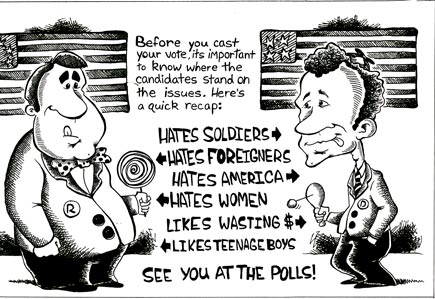Campus voters focus on higher education
Eastern’s recent tuition increases and faculty contract negotiations are a few reasons why higher education should be an important issue to campus voters today.
The gubernatorial election could be the beginning of a change of pace for Illinois higher education, an area of the state budget in need of attention.
However, neither gubernatorial frontrunners Democrat Rod Blagojevich or Republican Judy Barr Topinka have had much to say about higher education or how they plan to improve it.
Political science professor Dave Carwell said he has not seen a lot of plans for higher education coming from either Blagojevich or Topinka.
“Higher education is a hard political sell often times,” Carwell said.
More voters are interested in K -12 education than in higher education, Carwell said, which usually pushes higher education down on political priority lists.
“Someone in a position to become governor has to decide that we’re going to do something about higher education,” he said. “That’s what has to happen.”
The question is, will that person be Blagojevich, Topinka or neither?
Gov. Blagojevich’s plan to raise money for education would sell the state lottery.
“He has not really promised very much,” said Political Science Professor Andrew McNitt. And his track record in higher education doesn’t sit well with many people either.
Until this year when Eastern received a 1.4 percent budget increase, there had not been a state increase for university operations since the 1999-2000 academic year.
“If (under funding) is something the governor was opposed to it wouldn’t be happening,” Carwell said. “I doubt he’d be any more interested in higher education in his next term than he was in his first.”
Topinka’s plan is to provide $350 million for higher education operations to help slow tuition increases and also provide money for capital developments.
Al Grosball, campaign issues director for Topinka said the money would be generated by using Illinois 10th gaming license in the Chicago area where it could be most profitable.
“Higher education is a very important priority,” Grosball said.
But some say they haven’t seen Topinka’s plans for higher education either.
Leo Welch, chair of the Board of Trustees said education should be thought of as K – 16 to include higher education instead of stopping after high school.
“We have to let the public know that higher education is quite necessary,” Welch said. “If we’re going to compete globally, we’re going to have to have an educated work force.”
But increasing tuition rates are going to lessen the supply of that work force if they continue to increase.
Student Body President Sean Anderson hasn’t seen much from either candidate on the subject.
“One of the least mentioned things is higher education” on the campaign Web sites, Anderson said. “In my eyes I don’t think either candidate is making higher education much of a priority.”
He said he’s unhappy with Blagojevich’s track record, but doesn’t know that Topinka can follow through on her plans.
“Tuition keeps on going up and increasing,” Anderson said. “As students we should be concerned how much our tuition costs.”
Eastern’s new student tuition increased 12.5 percent for Fall 2006, and 12 percent for Fall 2005.
“It’s tough to say which one’s the better candidate,” Anderson said. “But the one making higher education more of an out there priority is Judy Barr Topinka.”
Charles Delman, president of the Eastern chapter of the University Professionals of Illinois has not seen anything he’s happy with from either Blagojevich or Topinka on higher education either.
“Gov. Blagojevich has seriously under funded higher education,” Delman said. At the same time, he has not seen any well developed plans coming from Topinka.
“It all comes down to funding and accessibility to me,” he said.
Universities need adequate funds to operate, and students need to have access to higher education no matter their income, he said.
He dislikes Blagojevich’s tax credit for students in their first two years of school who maintain B averages because the credit is based on grade point averages instead of financial needs.
“I don’t think that’s an effective way to direct financial aid,” he said.
As for Topinka, she has no track record yet to judge, but he said he has not seen any plans from her worthy enough of his vote.
Eastern President Lou Hencken just hopes that whoever is in office will pay attention to the needs of higher education.
“I don’t care who’s sitting there,” Hencken said. “But what I hope is that whoever sits in the governor’s office in the next four years can realize the importance of higher education.”
Hencken said state leaders have to do more than just care for higher education to make improvements. They must take steps to make it better.
But Carwell said that even with improvements, it will be 15 to 20 years before higher education would begin to reflect improvement.
“Regardless of who is governor of Illinois, higher education is going to be grossly under funded,” Carwell said. “It’s not going to get significantly better in the next four years,” no matter who is in the governor’s mansion.
“There’s only so much money to go around and we’ve already over committed,” said McNitt. “They both would like to do something for education, but they’re limited by how much money they have. Unless the financial problems of the sate are resolved, there won’t be much money left for higher education.”






































































